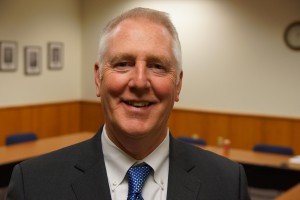This spring, the U.S. Supreme Court is expected to take up three cases on warrantless drunk driving tests, one of which has been litigated by a Mitchell Hamline alum.
“This is the third time I’ve asked the United States Supreme Court to take a look at this,” Jeff Sheridan ‘87 said. “And they finally said yes.”
Sheridan, who graduated from Hamline Law, a predecessor to Mitchell Hamline School of Law, has spent much of his career arguing that police officers need a warrant to test suspected drunken drivers’ breath, blood, or urine for alcohol. And he’s fought against a Minnesota law that prosecutes drivers who refuse such tests. That’s something Minnesota and a dozen others states allow under so-called “implied consent” laws.

Jeff Sheridan ’87 is “elated” that the U.S. Supreme Court has decided take on a case he’s litigated involving warrantless DWI tests.
Sheridan’s stand is that warrantless tests violate the Fourth Amendment, which protects U.S. citizens from unreasonable searches.
“There’s nothing special about DWI cases that exempt them from the rules that apply to every other kind of criminal investigation,” Sheridan said.
The incident that gained the Supreme Court’s attention occurred in 2012. That’s when Sheridan’s client, William Bernard, refused a sobriety test. He was arrested and charged with a felony for refusing the test.
A district court threw out the case, agreeing with Sheridan’s argument that officers needed a warrant to perform a breath test. Minnesota’s Court of Appeals overturned that decision in April 2015, upholding the state law that criminalizes refusal of such a test.
Now that it’s been accepted by the Supreme Court, Sheridan thinks his case is on solid ground.
He points to a similar 2013 case in which the Supreme Court ruled police officers in Missouri violated the Fourth Amendment rights of a man suspected of driving drunk when they forced him to give a blood sample.
Law enforcement officials and anti-drunk driving advocates maintain police need to be able to administer sobriety tests without a warrant.
In 2013, Mothers Against Drunk Drivers, or MADD, defended the warrantless tests. The group filed an amicus brief in the Missouri case, saying that in the time it takes to obtain a search warrant, a drunk driver’s body can dissipate alcohol, giving a defense lawyer leverage to obtain an acquittal. MADD contends the tests are key to reducing drunk driving accidents, which in 2013 killed more than 10,000 Americans and injured 290,000.
It can take police between 15 minutes and two hours to get a warrant from a judge in DWI cases. But, Sheridan claims, if state governments developed new electronic systems, police could obtain a warrant almost instantly.
Sheridan’s passion for criminal defense began as a law student at Hamline. He had planned to become a prosecuting attorney and judge, but a work-study job changed his course of study.
“Once I spent two semesters in the Federal Public Defender’s Office, I never thought about being a prosecutor or a judge again,” Sheridan said. “I love doing criminal defense work.”
Sheridan estimates that 90 percent of the clients at his Eagan-based firm, Sheridan & Dulas, are DWI defense cases.
Mitchell Hamline law professor Ed Butterfoss calls Sheridan’s challenges to Minnesota’s drunken driving laws “tenacious” and said he’s earned the respect of people on both sides of the issue.
Butterfoss believes the Supreme Court’s decision in this case will be of enormous importance. Whether or not justices agree with Sheridan’s position, it could potentially affect drunk driving laws in a number of states.
“No one likes drunk drivers,” Butterfoss said. “It is the classic case of an attorney representing an unpopular client in order to protect the constitutional rights of everyone. In this case, the right to be free from unreasonable searches.”
Sheridan said he’s “elated” that the Supreme Court will hear his case, but it’s not clear whether he’ll actually argue it himself. He’s currently working with Yale University’s Supreme Court Advocacy Clinic and the Washington, D.C., law firm Mayer Brown on the case.
“There are lots of people involved in this who can argue it,” Sheridan said. “I’m perfectly happy to let somebody else do it, so long as we get this issue resolved here in Minnesota.”
Supreme Court oral arguments in the case have yet to be scheduled. But Sheridan expects the case to make it on the court’s calendar by late March or early April.
